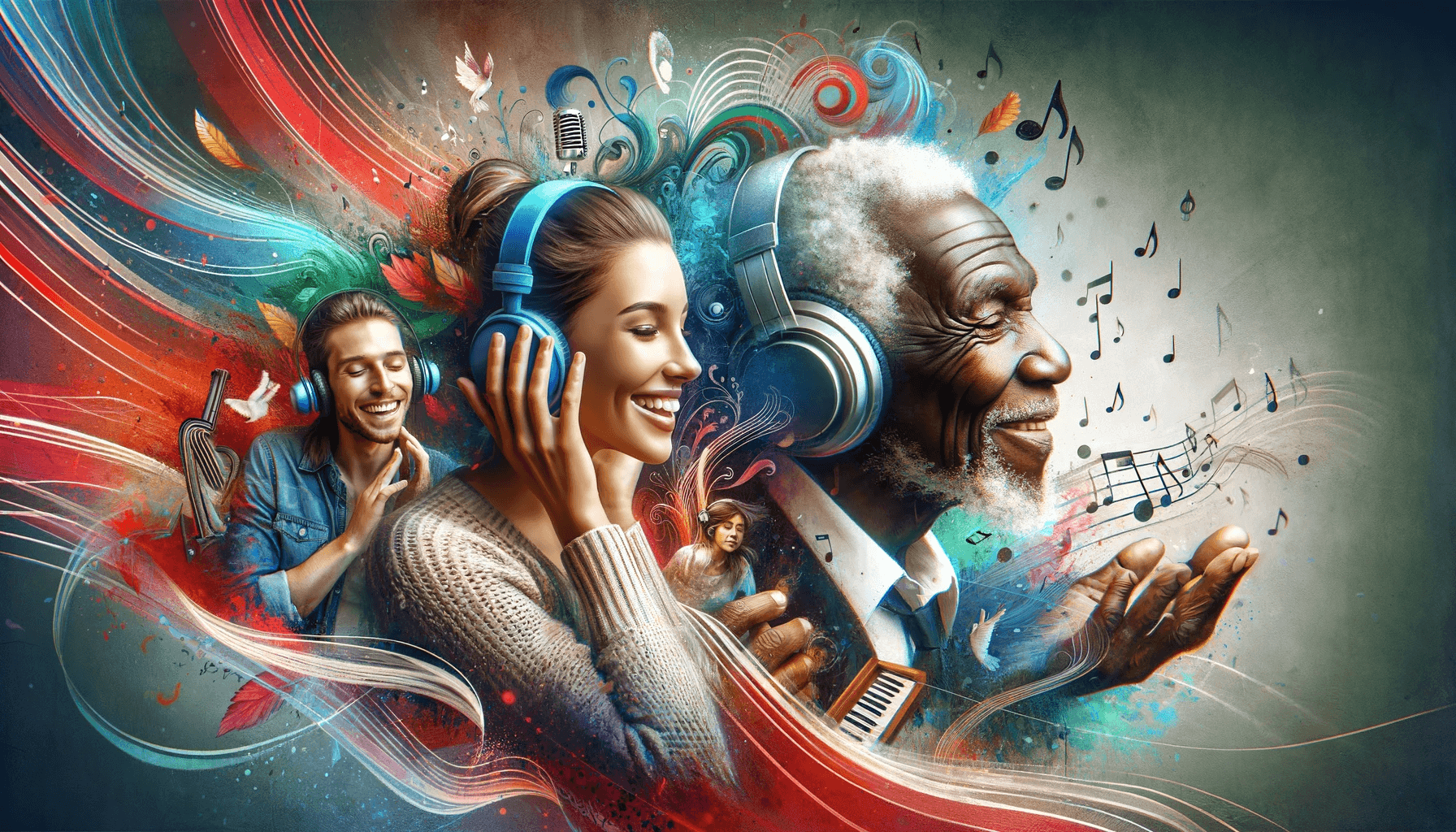Sponsor The Wealth Compass
Table of Contents
Introduction: The Power of Music and Emotion
It is no secret that music has the power to stir our emotions. Whether it’s the joyful melody of a favorite song or the haunting notes of a melancholy tune, music profoundly impacts our emotional state. But what is it about music that elicits such strong emotional responses? This article will explore the science behind the connection between music and emotion, how music can be used for emotional regulation, and examine the cultural influences on our emotional responses to music. By understanding the unique relationship between music and emotion, we can harness its power for our emotional well-being.
The Science Behind the Connection Between Music and Emotion
The connection between music and emotion is rooted in the very structure of our brains. Neuroscience research has shown that listening to music activates various brain regions associated with emotion, such as the amygdala and the prefrontal cortex. These regions are responsible for processing and regulating our emotional responses. Music’s rhythm, melody, and harmonies can evoke strong emotional reactions by stimulating these areas of the brain.
Additionally, music can trigger the release of neurotransmitters, such as dopamine and serotonin, which are closely linked to our emotions. These chemicals are responsible for feelings of pleasure, happiness, and relaxation. Listening to music that resonates with us can lead to an increase in these neurotransmitters, resulting in a positive emotional experience.
Emotional Responses to Music
Music can evoke many emotions, from joy and excitement to sadness and nostalgia. This is due to the complex interplay between the elements of music, such as tempo, pitch, and dynamics, and our emotional processing systems. For example, fast-paced and upbeat music with a strong rhythm can elicit feelings of happiness and energy, while slow and melodic tunes can evoke a sense of calm and tranquility.
Furthermore, our emotional responses to music are highly individual and can be influenced by our experiences, memories, and cultural background. Certain songs or genres of music may hold specific emotional significance for us based on the memories associated with them. For example, a song played at a joyful event in our lives may always bring back feelings of happiness and nostalgia when we hear it.
Music as a Tool for Emotional Regulation
One of the most remarkable aspects of the connection between music and emotion is its potential to be used as a tool for emotional regulation. Research has shown that listening to music can profoundly impact our mood and emotional well-being. For example, studies have found that listening to uplifting and positive music can improve mood and decrease anxiety and depression.
Music can also serve as a catharsis, allowing us to healthily express and release our emotions. Listening to music that resonates with our emotional state can provide a sense of validation and comfort, helping us navigate difficult emotions. Whether it’s a sad song that allows us to grieve or a motivational anthem that inspires us to persevere, music can be a powerful tool for emotional healing and self-expression.
Cultural Influences on Music and Emotion
The universal properties of music do not solely determine the connection between music and emotion. Cultural influences play a significant role in shaping our emotional responses to music. Different cultures have unique musical traditions and preferences that can impact the emotions evoked by specific types of music.
For example, in Western cultures, significant chords are often associated with happiness and minor chords with sadness. However, in other cultures, such as Indian classical music, the emotional connotations of different musical scales and modes can differ. Cultural factors such as language, tradition, and societal norms also influence the emotional meaning we attach to specific songs or genres of music.
Understanding the cultural influences on our emotional responses to music can broaden our appreciation for the diversity of emotional experiences that music can evoke. It reminds us that music is a universal language that transcends cultural boundaries yet is deeply intertwined with our unique cultural identities.
Music Therapy and Emotional Healing
Music therapy is a powerful tool for emotional healing and has been used for centuries to support individuals in their emotional well-being. Music therapists use various techniques, such as active music-making, listening to music, and songwriting, to help individuals express and process their emotions.
Research has shown that music therapy can effectively reduce symptoms of anxiety, depression, and stress. It can also improve emotional self-awareness, enhance mood, and promote relaxation. Music therapy is particularly beneficial for individuals with difficulty expressing their emotions verbally, such as those with autism or dementia.
The therapeutic benefits of music can be attributed to its ability to engage multiple areas of the brain simultaneously. By stimulating the brain’s emotional centers, music therapy can facilitate emotional release, provide a sense of comfort and connection, and promote overall emotional well-being.
The Role of Lyrics in Evoking Emotion
While instrumental music can evoke powerful emotions, lyrics add a layer of meaning and emotional depth to a song. The words we hear in a song can resonate with us, reflecting our experiences, struggles, and triumphs. Lyrics can tell a story, convey a message, or express emotions in a way that connects with our inner world.
The emotional impact of lyrics is not limited to the words themselves but also how they are delivered. The tone of the singer’s voice, the dynamics, and the phrasing can all contribute to the emotional effect of a song. The combination of lyrics and music creates a powerful medium for storytelling and emotional expression, allowing us to connect with the experiences and emotions of others.
The Influence of Music on Mood and Memory
Music has a remarkable ability to influence our mood and memory. We often associate particular songs or genres of music with specific memories or experiences, and hearing those songs can instantly transport us back in time. This phenomenon, known as the “reminiscence bump,” is believed to be due to the emotional significance of the memories associated with the music.
Moreover, music can be used as a mood-enhancing tool. Studies have shown that listening to music can directly impact our mood, with certain types of music eliciting specific emotional responses. For example, classical music has been found to promote relaxation and reduce stress, while upbeat and energetic music can boost mood and motivation.
Music and memory are also connected in therapeutic settings, such as dementia care. Music has been shown to improve memory recall and cognitive function in individuals with dementia, evoking memories and emotions that may otherwise be difficult to access. By tapping into the emotional power of music, we can enhance our mood and preserve cherished memories.
The Evolutionary Significance of Music and Emotion
The connection between music and emotion is not a mere coincidence but may have deep evolutionary roots. Anthropological evidence suggests that music has been a part of human culture for thousands of years, predating the development of written language. This raises the question: why did music evolve alongside human emotion?
One theory is that music is a form of social bonding and communication. Music can evoke shared emotional experiences and create a sense of unity within a group. It played a crucial role in strengthening social bonds, promoting cooperation, and enhancing the overall emotional well-being of early human communities.
Another theory is that music serves as a means of emotional regulation and self-expression. Just as we use music today to cope with our emotions and express ourselves, early humans may have used music as a tool for emotional release and communication. Music’s rhythmic and melodic elements may have served as a nonverbal language through which emotional states could be conveyed and understood.
Conclusion: Harnessing the Power of Music for Emotional Well-being
The unique connection between music and emotion is fundamental to the human experience. Music can evoke emotions, influence our mood and memory, and serve as a tool for emotional regulation and healing. By understanding the science behind this connection and appreciating the cultural influences on our emotional responses to music, we can harness the power of music for our emotional well-being.
Whether through active music-making, listening to music, or engaging in music therapy, we can use music as a powerful tool for emotional self-expression, relaxation, and personal growth. So, the next time you need a boost or a way to process your emotions, turn to the power of music and let it guide you on a journey of emotional exploration and healing.
CTA: Explore the transformative power of music in your own life. Create a playlist of songs that resonate with your emotions and use it as a tool for emotional self-care and well-being. Allow yourself to fully immerse in the music and let it guide you on a journey of emotional exploration and healing.




